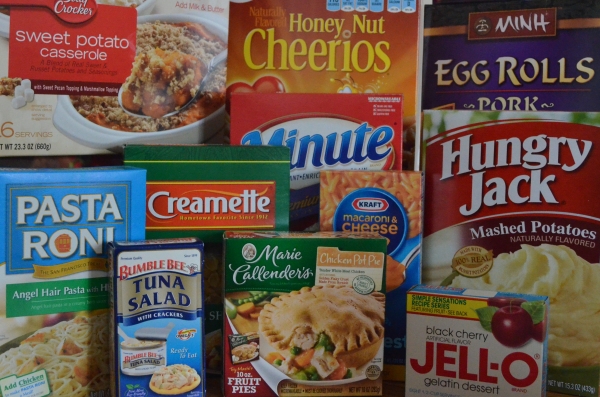Ten Reasons NOT to Eat "Outside the Box"
 In our quest for better health, many of us are considering a dietary change, one with fewer processed, "boxed" foods. Perhaps chronic illness is a motivating factor. Or a child with behavioral issues. Or simply a general desire to eat healthier.
In our quest for better health, many of us are considering a dietary change, one with fewer processed, "boxed" foods. Perhaps chronic illness is a motivating factor. Or a child with behavioral issues. Or simply a general desire to eat healthier.
All sorts of doubts creep in when we make a decision to change. Doubts that keep us from taking action. Below are ten such doubts, along with ten truths to counter them.
- People will think I'm crazy.
True.
People also thought physician Ignaz Philipp Semmelweis was crazy when he suggested that hand disinfection played a role in the health of birth mothers. The connection between the food we eat and our health seems equally obvious, but anytime we go against the tide we are likely to experience ridicule and skepticism. This is simply part of the journey.
- It's expensive.
True.
The immediate costs may be higher, but the long-term costs are likely to be significantly lower as we save on doctor appointments, emergency room visits, and prescriptions.
Colleen Huber, a naturopath, contends that eating organically is not necessarily more expensive. She did a comparison several years ago and found the two types of diet economically comparable. Her study can be found here. - It might not "work."
True.
Dietary change seldom yields immediate results. Completely restored health is not a guarantee. But there is no guarantee with any change we make. Isn't it better to try rather than not try? Why not take the risk of eating healthier? If life gets better, and it likely will, healing may simply be honey on the flax cracker (so to speak). - There are so many diets out there. They can't all be right.
True.
Some diets say juicing is good. Others say not. Some are vegan. Others are meat-based. Some are raw. Some are cooked. Some include sweeteners. Others do not.
What do they have in common? No approach invites people to eat unlimited fast food, refined sugar, soda, and boxed food.
But the confusion factor is one of the biggest hindrances toward altering our diet. This is where our intuition is a necessity. There is no "one size fits all" when it comes to diet. We're each unique, with our own specific needs.
Don't be afraid to research, study, and ask questions. Be willing to make changes as you go along. - It will be hard on my kids.
True.
It's also true that it is hard on our kids to continue to eat sugar and processed foods. The evidence for this is mounting. We can't protect our kids from pain; we can only do the best we can with the best explanation we can offer. If a child understands the reasons for the unusual foods, he/she may be more willing to try. Offer a trial period such as 30 days. It's often difficult for a child to think of giving up these refined/processed foods "forever."
Try to find fun, creative alternatives for special occasions like holidays and birthdays.
The movie Breaking and Entering is not kid-friendly, but it does have one scene where Jude Law sits down to a dinner of chicken and vegetables. His wife explains the gut/brain connection and the role diet can play in restoring health to their ill child. The daughter throws a temper tantrum because of the missing ice cream. This scene could help some kids feel less "alone" with their feelings of resentment. - I might get sick.
True.
Sometimes the body is so worn down it doesn't let us know the food we're eating is doing us harm. If sugar is perpetuating some of the bad "bugs," we often don't know it. When our body "wakes up" and we start feeding it healthier foods, toxins can die and create die-off symptoms, which are often worse than the general feeling of malaise we may have started with. There are numerous ways to get through the die-off, such as Epsom salt baths, activated charcoal, vitamin C, and many others.
If we're willing to get worse before we get better, we may eventually enjoy a whole new level of health. - My food might not taste good.
True.
Diets high in processed foods "trick" the body into thinking it likes something, when in fact our taste buds are "dumbed down" rather than enhanced. Give new foods a try. Study the taste system and you'll find that we are designed for nutritional intricacy.
Freshly-made sauerkraut spooned over a brisket stew is a flavorful powerhouse because, according to Dr. Catherine Shanahan, author of Deep Nutrition:
You may be shocked at the foods you will love! And how quickly the processed foods lose their appeal.Though taste buds may taste one kind of flavor predominately, one bud can in fact detect different flavor ligands simultaneously. It turns out, the more, different kinds of flavors there are, the more we taste each one. When peptides and salt ions bind at the same taste bud, the result is not a doubling of flavor, but a powerful thousand-fold magnification in the signal going to your brain. . . . (This is why hot dogs, for instance—or better yet, actual sausage—taste better with sauerkraut and bittersweet mustard.)
- Extreme dietary restriction isn't necessarily a good thing.
True.
Eating good, healthy, REAL food does not need to involve restriction. If you look at the ingredients in a fast food meal, you'll find that corn and soy are behind most of it. In his book The Omnivore's Dilemma, Michael Pollan breaks down the corn content of a fast food meal this way: soda 100% (since it consists primarily of high fructose corn syrup), milk shake 78%, salad dressing 65%, chicken nuggets 56%, cheeseburger 52%,and french fries 23%.
In contrast, there are more than 70 types of vegetables, numerous varieties of animals, and lots of parts to these animals. There are an abundance of herbs and spices to flavor these foods.
For some people, extreme may not be necessary. Eating less fast food and cooking more from scratch may be enough.
But for those with severe illness, this quote from Hippocrates may apply: "Extreme remedies are very appropriate for extreme diseases."
Sometimes a strong message to the body can lead to a big change. - I don't think I can get my spouse or older children on board.
True.
We can't control others, in any area of life. We can, however, do our best to educate and explain. We can lead by example. We can try. A slow transition is often better than an abrupt, unwelcome change. Introduce one food at a time and try to find satisfying substitutes for their favorite foods. Ask for a family experiment. Initiate challenges. Make the change as exciting as possible. - It will be difficult.
True.
There's simply no way around this one. It is hard to change patterns, food patterns especially. Good things don't come easily. There's no magic pill when it comes to health and diet. Convenience foods are just that: convenient. But there is something gratifying and empowering about this kind of hard work.
In summary, there are plenty of reasons to stick with the "old way." Plenty of reasons not to step out and try something new. This quote by Oliver Wendell Holmes offers some powerful inspiration:
I find the great thing in this world is not so much where we stand, as in what direction we are moving: To reach the port of heaven, we must sail sometimes with the wind and sometimes against it—but we must sail, and not drift, nor lie at anchor.
Today is a new day with new possibilities. The perfect time to set sail.

